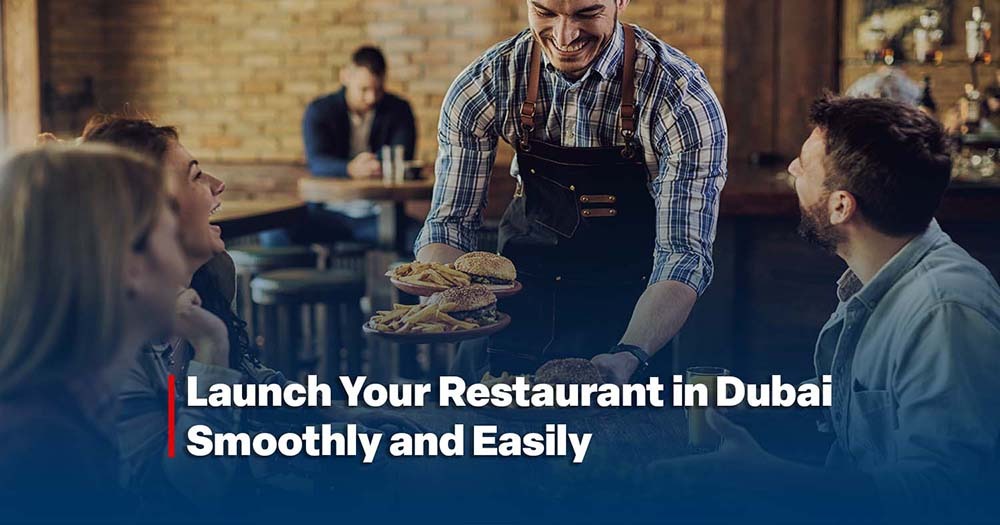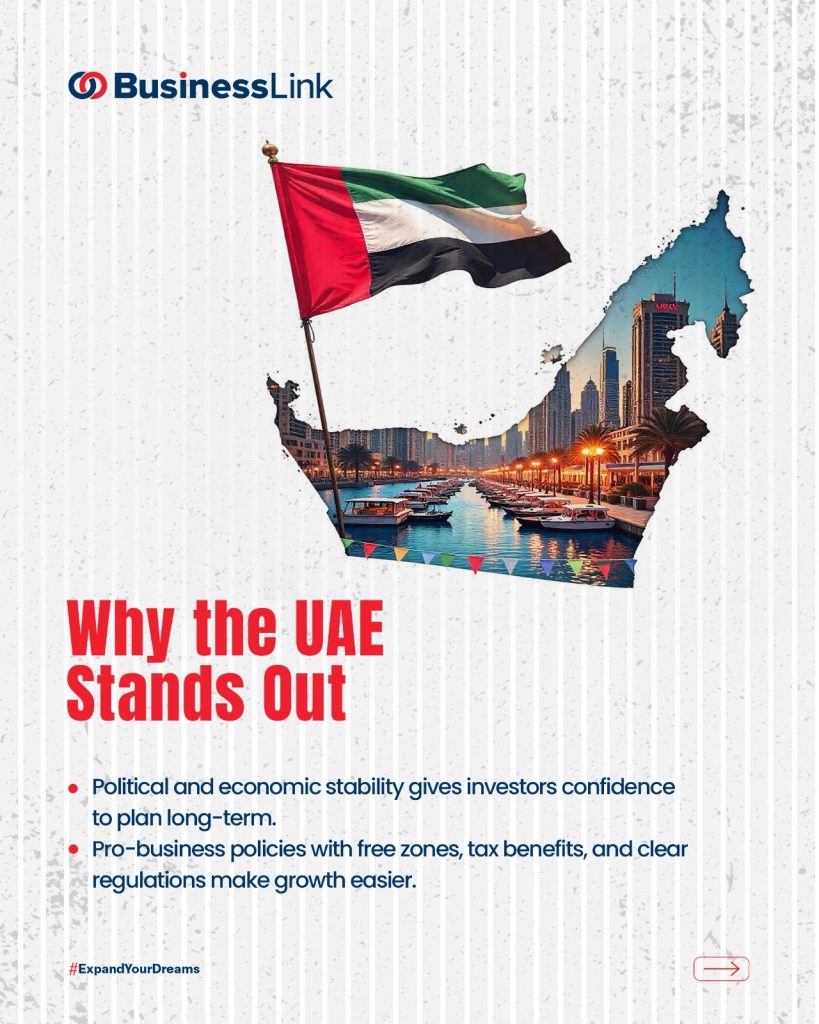Restaurant in Dubai sounds like a dream, but why do 60% close within their first year? According to Gulf Business, many fail due to poor planning and rushed licensing. If you’re serious about starting one, you’ll need more than recipes. You’ll need a clear path. So, what steps help you avoid the common traps and open with confidence? Let’s break it down.
Table of Contents
Toggle- Why Opening a Restaurant or Cafeteria in Dubai is the Best Business Move for 2025?
- Restaurant Licenses in Dubai: The Ultimate 2025 Guide
- Step-by-Step Guide to Obtaining a Cafeteria License in Dubai: Easy Process
- Restaurant License Cost in Dubai: Your Clear 2025 Breakdown
- Essential Documents and Requirements to Start a Restaurant in Dubai
- Dubai Food Code 2025: The Complete Guide for Restaurant Compliance & Success
- Requirements for Your New Restaurant in Dubai
- Key Factors for Restaurant Success in Dubai
- Summary
- FAQ’s
Why Opening a Restaurant or Cafeteria in Dubai is the Best Business Move for 2025?
Opening a restaurant in Dubai is one of the smartest business moves you can make in 2025. The food sector is expanding rapidly, with the UAE market projected to grow from $23 billion in 2025 to over $52 billion by 2030. This incredible growth is fueled by a record 18.72 million international tourists in 2024 and a local population where over 52% of residents dine out at least three times a week. For any entrepreneur, this represents a powerful and profitable opportunity.
Read more about How to start a coffee shop in dubai.
Key Reasons to Start a Restaurant or Cafeteria in Dubai
- Massive Tourist Demand: Millions of visitors ensure a year-round customer base
- Diverse Population: Over 200 nationalities live in Dubai, creating daily demand for every kind of global cuisine.
- Strong Dining Culture: Dining out is a favorite activity, providing consistent growth for well-run establishments.
- Flexible Business Models: From fine dining to cloud kitchens, various formats thrive here.
- Affordable Entry Point: A cafeteria is a brilliant way to start, requiring less capital and space.
- Zero Personal Income Tax: You keep more of your hard-earned profits.
- Long-Term Residency: A restaurant license can help investors qualify for a long-term visa.
- Fast and Clear Licensing: The setup process is streamlined and efficient.
- Built-in Delivery Market: Platforms like Talabat give you instant access to a delivery market valued at $720 million.
- Easy Expansion: Once successful, you can open branches across the UAE.
Read more to know how to open a baqala in Dubai.
Cost and Setup Comparison
This table breaks down the key differences to help you choose your path:
| Factor | Restaurant in Dubai | Cafeteria in Dubai |
| License Type | Restaurant license in Dubai | Food & Beverage trade license |
| Setup Cost | AED 150,000 – 250,000 | AED 80,000 – 120,000 |
| Staff Needed | Chef, servers, manager | Barista, helpers, cashier |
| Monthly Rent | AED 20,000 – 35,000 | AED 8,000 – 12,000 |
| Equipment Costs | AED 40,000 – 80,000 | AED 15,000 – 25,000 |
| Profit Margins | 20–35% | 15–25% |
| Main Customers | Tourists & high-income residents | Daily workers & students |
Why Dubai Stands Out
Several powerful trends make now the perfect time to invest:
- Tech-Savvy Diners: A remarkable 74% of diners in the UAE find new restaurants through social media, making digital marketing highly effective.
- Experience Economy: Consumers are willing to splurge, with 89% returning to a restaurant after a unique, memorable experience.
- Government Support: Ongoing reforms actively encourage entrepreneurs and new business ventures.
- Global Food Hub: Dubai is now a top global food destination, ranked 9th in the world for its culinary scene, which attracts more food-loving visitors.
Dubai offers a rare combination of a booming market, a diverse customer base, and a supportive operating environment. Whether you start a fine dining restaurant in Dubai or start small with a cafeteria business, both models can succeed with the right plan. With expert help from business link UAE for company registration and licensing, your restaurant business in Dubai can start quickly and run smoothly.
Restaurant Licenses in Dubai: The Ultimate 2025 Guide
Opening a restaurant in Dubai or a cafeteria is a smart move. We will break down the types of licenses available, what each one covers, and how to choose the best fit for your business.
Types of Restaurant Licenses in Dubai
| License Type | Best For | Key Points to Know |
| Mainland Restaurant License | Restaurants serving the general public across Dubai. | •Issued by the Economic Development Department (DED).
• Lets you operate anywhere in Dubai. • Requires a commercial space and Ejari tenancy contract . |
| Free Zone Restaurant License | Businesses wanting 100% foreign ownership. | • Issued by the Free Zone authority.
• Operations are limited to the Free Zone. • Offers lower setup costs and tax benefits . |
| Cafeteria License | Small outlets offering quick meals and snacks. | • Easier and cheaper to set up than a full restaurant.
• Fewer regulations and lower investment. • Perfect for a casual dining experience . |
| Food Truck License | Mobile food vendors. | • Allows you to serve food in different locations.
• Requires specific permits from the DED and Dubai Municipality for mobility . |
| Cloud Kitchen License | Delivery-only food businesses. | • No dine-in space needed, which lowers overhead costs.
• Ideal for online orders and app-based delivery . |
| Catering License | Offsite food service for events and offices. | • Allows food prep and delivery outside your main kitchen.
• Requires a central kitchen that meets Dubai Municipality health standards . |
Extra Permits You Might Need
Depending on your setup, you will need additional approvals from Dubai authorities :
- Dubai Municipality Food Permit: This is non-negotiable. The Food Safety Department will inspect your kitchen layout, storage, and ventilation systems before granting this mandatory permit .
- Alcohol License (Type C): Required if you plan to serve alcohol. This is issued by the Dubai Police and comes with strict regulations, including designated serving areas and times .
- Shisha Permit: A separate permit is needed for restaurants offering shisha (hookah) to customers .
- Pork Permit: Required for establishments that wish to handle and serve non-Halal pork products, with specific storage and preparation guidelines .
- Import Clearance – For bringing in food ingredients from abroad .

Mainland vs. Free Zone: What’s the Difference?
Your choice between a mainland and free zone location is crucial and will define your licensing path and growth potential .
- Mainland License (DED): Issued by the Department of Economic Development (DED), this license allows you to operate your restaurant in Dubai anywhere in the emirate and directly serve the entire local market. It’s the best choice for businesses targeting the general public .
- Free Zone License: If you choose to set up in a free zone, you will get your license from that zone’s authority. The key benefit is 100% foreign ownership. However, a significant trade-off is that your operations are usually restricted to within the free zone, which may not be ideal for a public-facing restaurant .
License Cost and Setup Time
Please note that these are approximate figures and can change.
| License Type | Cost Range (AED) | Setup Time |
| Restaurant | 12,000 – 15,000 | 2–4 weeks |
| Cafeteria | 10,000 – 15,000 | 2–3 weeks |
| Food Truck | 10,000 – 12,000 | 2–3 weeks |
| Cloud Kitchen | 15,000 – 18,500 | 3–4 weeks |
| Catering | 12,000 – 15,000 | 3–5 weeks |
| Snack Bar | 60,000 – 110,000 | 2–3 weeks |
How to Choose the Right License
Selecting the perfect license is a straightforward process if you break it down.
- First, define your core service. Are you a food truck, a fine-dining establishment, or a delivery-only kitchen? Your operational model is the primary driver of the license type you need .
- Next, consider your location strategy. Do you want to serve customers directly from across the city? If so, a mainland license is essential. A free zone might only work for a catering company targeting other businesses within that zone .
- Finally, account for add-ons. Will you serve shisha, have outdoor seating, or play live music? Therefore, you must budget for and apply for these special permits separately during the setup process .
Dubai’s food market is full of opportunity. Whether you’re launching a small cafeteria or a restaurant in Dubai, the city offers a clear path to success. Choose the license that fits your plan, follow the steps, and get expert help if needed. With the right setup, your food business can grow quickly and serve a wide range of customers.
Step-by-Step Guide to Obtaining a Cafeteria License in Dubai: Easy Process
Starting a cafeteria or a restaurant in Dubai, is a smart and profitable business venture. With the right steps, you can easily obtain your cafeteria license while complying with local regulations.
Step-by-Step Licensing Process:
Choose and Register Your Trade Name
Pick a unique business name and register it with the Department of Economic Development (DED). Reservation fee: AED 620.
Obtain Initial Approval
Apply to DED for initial approval. This ensures your food activity is allowed. Fee: AED 115.
Secure a Location and Register Ejari
Find a suitable commercial space and register your tenancy contract with Ejari. Cost: AED 500.
Get Layout Approvals
Submit your cafeteria’s layout plan to the Dubai Municipality. This ensures compliance with health and safety regulations.
Apply for the Food License
After layout approval, apply for the food license from the Dubai Municipality’s Food Safety Department.
Secure Final Trade License
Once all steps are complete, the DED will issue your final trade license, allowing legal operation.
Essential Document Checklist
- Passport copies of all business partners
- Memorandum of Association (MOA)
- Tenancy contract registered with Ejari
- Approved layout plan from Dubai Municipality
- Trade name reservation certificate
Restaurant License Cost in Dubai: Your Clear 2025 Breakdown
Starting a food business in Dubai is an exciting opportunity. However, a solid budget plan is your first step to success. The cost of a restaurant license in Dubai isn’t one single fee. Instead, it’s a series of essential government charges. I give you a clear breakdown for 2025, helping you plan your investment with confidence.
The table below summarizes the core government licensing fees you’ll need to pay.
| Fee Type | Approximate Cost (AED) | Issuing Authority & Purpose |
| Trade License | 10,000 – 30,000 | Department of Economic Development (DED). Your core business permit. |
| Food License | 10,000 – 15,000 | Dubai Municipality Food Safety Department. Mandatory for all food handling. |
| Alcohol License | 20,000 – 100,000+ | Dubai Police and relevant authorities. Required only if you plan to serve alcohol. |
| Signage Permit | 2,000 – 5,000 | Dubai Municipality. Needed for your restaurant’s exterior sign. |
Here are the other essential steps and their associated costs:
- Trade Name Registration: First, you must register a unique name for your business. This costs around AED 620.
- Initial Approval Fee: Next, you pay approximately AED 115 to the DED for initial approval of your business activity.
- Tenancy Contract (Ejari): Then, you must register your commercial lease. This costs about AED 500 and is mandatory for your license application.
Key Advantages of Starting Your Food Business in Dubai
Beyond the costs, it’s helpful to remember why so many entrepreneurs choose Dubai. The city offers a uniquely supportive environment:
- Zero Personal Income Tax: The UAE’s tax system is a major advantage. You keep more of your hard-earned profits, which helps with reinvestment and growth
- Speedy and Clear Process: With the right preparation, the licensing process is streamlined and efficient, often faster than in many other major cities.
- Diverse Customer Base: Dubai’s multicultural population and massive tourist influx ensure a steady demand for a wide variety of cuisines.
- Business-Friendly Environment: The UAE government actively supports foreign investment with clear rules and fast approvals, making it easier to get started.
Starting a restaurant business in Dubai is a lucrative opportunity, but success hinges on realistic financial planning. While the government license fees are a known factor, your largest expenses will be commercial rent and interior fit-out.
I hope this detailed breakdown provides a trustworthy and clear financial starting point. Does your concept lean more towards a fine-dining restaurant or a quick-service cafeteria? Knowing your model is the first step to creating a more precise budget.
Essential Documents and Requirements to Start a Restaurant in Dubai
Starting a restaurant in Dubai presents an exciting business opportunity, but navigating the legal requirements is essential for smooth operations. Understanding and obtaining the necessary documents and approvals will ensure your restaurant complies with Dubai’s regulations and operates legally.
Key Documents and Requirements
| Document/Requirement | Issued By | Why You Need It |
| Restaurant License | Department of Economic Development (DED) | Required to legally operate your restaurant in Dubai. |
| Food Safety and Health Permit | Dubai Municipality’s Food Safety Department | Ensures compliance with food hygiene and safety standards. Mandatory for all food businesses. |
| Tenancy Contract (Ejari) | Dubai Government | Legal requirement to register your commercial lease and obtain the restaurant license. |
| Trade Name Reservation | Department of Economic Development (DED) | Secures your restaurant’s name and protects your brand identity. |
| Initial Approval from DED | Department of Economic Development (DED) | Confirms that your business complies with local regulations before moving forward. |
| Layout Plan Approval | Dubai Municipality | Ensures your restaurant’s floor plan meets health, safety, and space regulations. |
| Food Handling Staff Health Cards | Dubai Municipality & Health Authority | Confirms all food handlers meet health standards. Required for staff involved in food preparation. |
| Staff Visas | UAE Government | Required for legally hiring employees in your restaurant. |
| Alcohol License (if applicable) | Dubai Police & Relevant Authorities | Required if you plan to serve alcohol. Ensures compliance with strict service rules. |
| Shisha License (if applicable) | Dubai Municipality | Required if you plan to offer hookah (shisha) services. |
Additional Documents You Might Need
| Document | Purpose |
| Trade Name Registration Certificate | Confirms your restaurant’s name is officially registered with DED. |
| Passport Copies of Owners/Managers | Verifies the identities of the key individuals in your restaurant business. |
| Work Visas Copies | Ensures all employees have the correct documentation to legally work. |
| No Objection Certificate (NOC) | May be required, especially for specific location-related approvals or activities. |
| Trade License Application Form | Required for the Department of Economic Development to process your restaurant license. |
| Food Safety and Hygiene Documents | Certifications proving your restaurant meets food safety and hygiene standards. |
| Health Certificates | Required for food-handling staff to ensure compliance with food safety standards. |
| Bank Statements | Demonstrates financial stability and the ability to fund your restaurant operations. |
| Food Establishment License Application Form | Ensures your restaurant meets safety regulations for food services, required by the Dubai Municipality. |
Essential Steps for Smooth Restaurant Operations in Dubai
- Streamlined Operations: Having all the necessary documents in place ensures a smooth start for your restaurant operations.
- Compliance with Local Regulations: Adhering to Dubai’s strict food safety and business regulations helps avoid penalties and delays.
- Expert Guidance: Seeking professional assistance guarantees that you meet all requirements promptly, reducing potential bottlenecks.
By ensuring all these documents and permits are in place, you can confidently start your restaurant in Dubai or cafeteria. This preparation ensures compliance with Dubai’s regulations and helps you avoid unnecessary delays. Dubai’s vibrant food market offers excellent opportunities, and with the right guidance, your restaurant can succeed and expand rapidly.
Dubai Food Code 2025: The Complete Guide for Restaurant Compliance & Success
Starting a food business in Dubai means you need to follow clear safety rules. So, think of the Dubai Food Code as your essential roadmap. This system, managed by Dubai Municipality, sets world-class standards. Understanding these rules isn’t just helpful—it’s mandatory. In fact, you need this knowledge to pass inspections and get your license. I will break down everything you need to know.
Understanding the Food Safety Framework
- Dubai’s food safety system operates under a comprehensive federal law. Federal Law No. 10 of 2015 on Food Safety forms the foundation. This law emphasizes consumer protection. Consequently, it applies to all food items meant for human consumption.
- The Dubai Municipality Food Safety Department actively enforces these regulations. They conducted over 34,700 food inspections in just the first half of 2025. Their mission is to protect public health. At the same time, they support Dubai’s vision as a leading global food destination.
Core Food Code Requirements for Restaurants
The Dubai Food Code covers several critical areas. Here are the essential components you must implement:
| Requirement Category | Key Specifications | Governing Authority |
| Food Safety Systems | Implement HACCP, temperature control, and cross-contamination prevention | Dubai Municipality |
| Facility Standards | Layout approval, proper ventilation, waste disposal systems, and zoning | Dubai Municipality |
| Staff Health & Training | Medical checks, health cards, and food safety training | Dubai Municipality & Health Authority |
| Documentation & Labeling | FIRS registration for imported goods, Arabic/English labels | Food Import and Re-export System (FIRS) |
Food Safety Management
First, you must implement a HACCP system. This internationally recognized approach helps identify potential food safety hazards. Additionally, you need strict temperature controls for all perishable items. Proper storage conditions prevent bacterial growth. They also stop food spoilage.
Facility & Layout Design
Your restaurant’s layout must receive official approval before opening. The design should ensure proper workflow between different kitchen areas. There must be a clear separation between raw and cooked food preparation zones. You also need adequate ventilation systems. Furthermore, dedicated waste disposal arrangements are crucial.
Staff Hygiene & Training
All food handling staff must undergo medical checks. They also need to obtain valid health cards. These certifications ensure that employees don’t carry contagious diseases. Staff also need regular food safety training. This includes handwashing techniques and proper uniform use.
Documentation & Product Registration
If you import any food products, you must register them through FIRS. All food labels must be in both Arabic and English. This provides complete transparency about ingredients. It also shows expiration dates clearly.
Inspection Protocols & Compliance Monitoring
Dubai Municipality conducts rigorous inspections. Understanding this process helps you prepare effectively.
Risk-Based Inspection Approach
The UAE is implementing a revolutionary inspection system. It categorizes businesses by risk level. High-risk establishments face more frequent inspections. Lower-risk businesses undergo fewer checks. This streamlines the compliance process.
Common Inspection Focus Areas
During inspections, officers typically verify several key areas:
- Food storage conditions and temperature monitoring records
- Kitchen cleanliness and sanitation procedures
- Staff health cards and training documentation
- Pest control measures and prevention systems
- Food labeling accuracy and product registration
The municipality also starts intensified inspection campaigns during high-demand periods. For example, they deploy hundreds of specialists during Eid Al-Adha.
New 2025 Regulations: What’s Changed
The UAE’s food safety framework has recently evolved. Here are the key updates every food business must know:
Unified Food Safety Framework
The 2025 regulations create a standardized national system. This eliminates previous fragmentation across emirates. Now, compliance is more straightforward for multi-location businesses. The system draws from successful models like Abu Dhabi’s Risk-Based System.
Enhanced E-Commerce Regulations
With the growth of online food sales, the 2025 framework introduces strict e-commerce compliance. The Telecommunications and Digital Government Regulatory Authority now oversees online food businesses. If you operate a cloud kitchen, you must meet the same standards as physical restaurants.
Nutri-Score Labeling System
A major change is the introduction of nutritional labeling. This system classifies food products into health grades (A through E). Initially covering baked goods and dairy products, it helps consumers make informed choices.
Practical Steps for Compliance
Meeting Dubai’s food code requirements involves several actionable steps:
- Start with proper licensing: Secure your trade license from the Department of Economic Development first
- Design your facility correctly: Work with architects familiar with Dubai Municipality’s layout requirements
- Implement HACCP systems: Develop and document your food safety management system
- Train your team thoroughly: Ensure all staff complete required food safety training and medical checks
- Register your food products: Use the FIRS system for any imported or packaged goods
- Prepare for inspections: Maintain accurate records and conduct regular self-audits
Getting Help with Compliance
Navigating Dubai’s food regulations can be complex. Fortunately, several resources are available:
- Dubai Municipality’s Food Safety Department provides guidelines and direct support
- The Official UAE Government Portal offers comprehensive information on federal requirements
- Professional business setup consultants like Business Link UAE can help with licensing and product registration.
Requirements for Your New Restaurant in Dubai
Getting your restaurant’s design right is your first major step. It’s not just about aesthetics; it’s a strict legal requirement. Your layout plan is the very first thing authorities like the Dubai Municipality will check. A well-planned space ensures you pass inspections, protects your customers, and sets you up for long-term success. Here’s a clear breakdown of what you need to know.
1. Secure Official Layout Plan Approval
- First, you must submit a detailed blueprint to the Dubai Municipality.
- This plan needs to show every area of your operation.
- Consequently, it is the foundation for your entire application.
2. Design for Clear and Safe Space Zoning
- Your floor plan must show distinct zones for different activities.
- Specifically, you need a clear separation between food preparation, storage, and customer seating areas.
- This smart zoning is crucial for preventing cross-contamination.
Ensure Proper Minimum Space Requirements.
- Your commercial space must meet minimum size standards.
- Generally, the total area should be at least 750 square feet.
- Furthermore, the kitchen itself typically needs to be 300 square feet or 40% of the total area, whichever is larger.
Install a Powerful, Approved Ventilation System.
- A high-quality extraction system is absolutely non-negotiable.
- It must effectively remove cooking smoke, steam, and strong odors.
- Therefore, your architectural plans must detail the entire ventilation layout for approval.
Use Approved, Washable Surface Materials.
- All surfaces in kitchens and food preparation areas must be durable and easy to clean.
- For this reason, you should use non-porous materials like stainless steel, ceramic tiles, or sealed epoxy coatings.
- This prevents bacterial growth and supports hygiene.
Plan for Efficient Waste Management
- You must designate a specific area for waste disposal within your layout.
- This system must follow Dubai Municipality’s sanitation guidelines.
- Proper planning prevents contamination and pest issues.
Integrate Comprehensive Fire Safety from the Start
- Your design must incorporate fire safety from the ground up.
- Use fire-resistant materials for walls and ceilings.
- Additionally, you need to plan for alarms, extinguishers, and clearly marked emergency exits that meet Dubai Civil Defence standards.
Design Accessible Entry, Exit, and Restroom Routes
- Map out clear, wide passages for customers and staff.
- This is not just for convenience; it is a key safety requirement for emergencies. Likewise.
- Restrooms must be accessible and meet all health standards.
Following these architectural rules is your first big step toward launching your restaurant business in Dubai. A compliant design streamlines the licensing process and creates a safe, fantastic experience for your guests, giving you the best chance to succeed in Dubai’s dynamic food scene.
Key Factors for Restaurant Success in Dubai
Running a restaurant in Dubai takes more than great food. You need strong planning, consistency, and a clear understanding of the local market. Dubai’s food industry grows fast, but only well-prepared businesses stand out. Here’s what separates success from struggle.
Essential Factors for Success
- Unique Concept: Create a distinct idea that reflects Dubai’s diversity. Stay consistent in your theme, menu, and service to build recognition.
- Prime Location: Choose a visible, accessible spot with steady traffic. Malls, business districts, and waterfront areas attract daily crowds.
- Food Quality and Consistency: Serve dishes that keep customers coming back. Even during busy hours, quality and presentation must remain the same.
- Customer Experience: Focus on details—clean tables, friendly staff, quick service, and a welcoming atmosphere. Small touches build loyalty.
- Strong Online Presence: Use Google Business, social media, and review sites. Encourage real feedback and share updates regularly to stay visible.
- Smart Menu Design: Keep the menu simple but appealing. Balance popular dishes with cost efficiency to protect profit margins.
- Trained and Motivated Staff: Hire skilled employees who respect hygiene and hospitality standards. Continuous training improves performance and customer trust.
- Cleanliness and Ambience: Maintain spotless dining and kitchen areas. Comfortable lighting and sound add to a relaxing experience.
- Legal and Licensing Compliance: Apply early for your restaurant license in Dubai to avoid delays. Compliance builds credibility and smooth operations.
- Local Understanding: Respect Dubai’s cultural mix and dining preferences. Adjust your offerings for different occasions and events like Ramadan.
- Cost Management: Watch rent, food waste, and energy use. Controlling overheads keeps your restaurant business in Dubai profitable.
- Technology Integration: Use POS systems, online ordering, and delivery apps. This keeps your service efficient and your customers satisfied.
- Marketing and Promotions: Run smart local promotions. Partner with influencers and use targeted ads to reach both residents and tourists.
- Adaptability: Update your menu, layout, and strategy as trends evolve. Flexibility helps your restaurant stay relevant year-round.
Summary
Can You Really Start a Restaurant in Dubai Without Trouble? Yes, and the first move is simpler than you think. Business LinkUAE handles your company registration, visa process, and setup with care and speed. If you’ve dreamed of opening a restaurant in Dubai, now’s the time to act. Don’t wait for someday. Call today, and let’s turn your idea into a place people love. Your table’s waiting, and so are your customers.
Call our team today via phone at +97143215227, WhatsApp at +971502052735, or email at connect@businesslinkuae.com and get clear answers, expert advice, and hands-on help so you can attend your appointment fully prepared and confident.
FAQ’s
Is Dubai a good place to open a restaurant or a cafeteria?
Yes. High tourism and diverse food culture support strong restaurant or cafeteria success.
Do I need a separate permit for food delivery?
Yes. You need approval from the Roads and Transport Authority (RTA) for food delivery.
Can I serve alcohol in my Dubai restaurant?
Only if your restaurant is in a hotel or you get a liquor license.
What are the best areas to open a restaurant in Dubai?
Popular zones include Jumeirah, Downtown, Business Bay, and Dubai Marina.
What are the food safety rules for restaurants in Dubai?
Dubai Municipality requires clean kitchens, pest control, and clear food labeling.
How much money do I need to open a restaurant in Dubai?
Answer: You should budget between AED 500,000 and AED 1.5 million for setup costs. This varies by location and restaurant type.
Can a foreigner own 100% of a restaurant in Dubai?
Yes, you can often maintain 100% foreign ownership in a Free Zone or on the Mainland.
How long does it take to get a restaurant license in Dubai?
Generally, the full licensing process takes between three and six months, depending on location and approval speed.
Which is better for a new restaurant: Mainland or Free Zone?
Mainland allows you to trade across the UAE freely. Meanwhile, Free Zone gives 100% ownership and tax benefits.
Do I need approval for my kitchen layout?
Yes, Dubai Municipality’s Food Safety Department must approve your detailed kitchen layout and fire safety plans beforehand.
What is the minimum size requirement for a cafeteria?
A 500 square feet to get final approval from Dubai Municipality.
Where can I get support for setting up my restaurant in Dubai?
You can get full legal, licensing, and visa support from Business linkUAE





